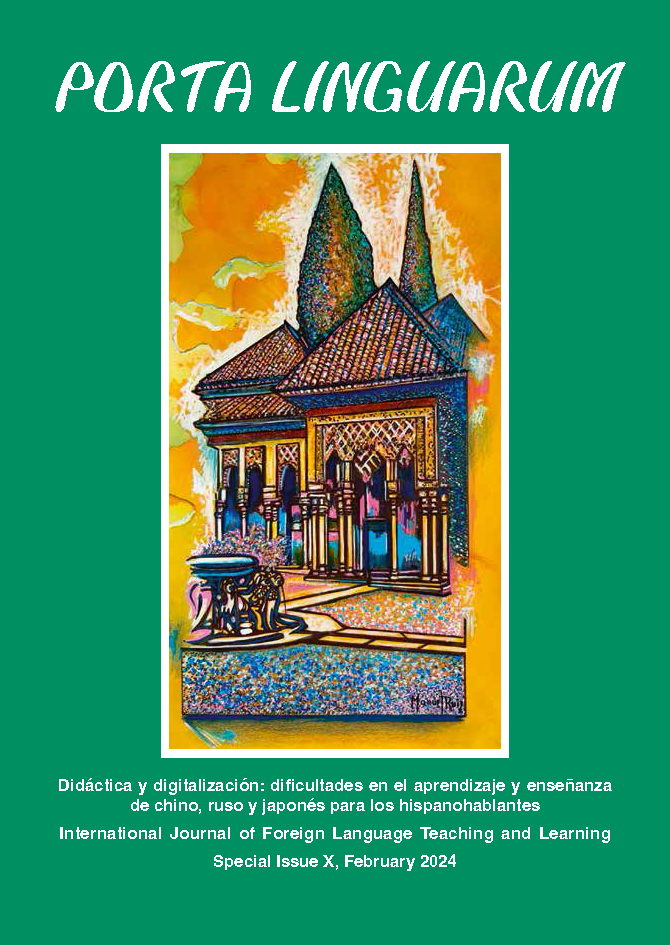Intercultural conflicts in Japanese language and culture-using teaching practices to find solutions in the classroom
DOI:
https://doi.org/10.30827/portalin.viX.27391Keywords:
intercultural conflicts, mediation, translation without translations, identity, plurilingual and pluricultural competence.Abstract
It is often said that learning a language is learning a culture, and japanese, a language very different from european languages, is very strongly influenced by its culture. the acquisition of a second language influences an individual's identity, fosters his or her plurilingual and pluricultural competence and enriches human development. however, it is also true that there are several intercultural conflicts before this point is reached. in this article, we will analyse these conflicts through life-story interviews with three spaniards who have lived in japan for a long period of time, as well as using a chapter of the recent video "activate your japanese" (2022). this video deals with mediation from the perspective of japanese language learners. the concept of mediation, considered by pym (2014) as a synonym for translation, but which puts an emphasis on the process of placing oneself between two different cultures, will be used as a methodological focus. in this way, we will see that the translating or mediating process is not necessarily a positive act but can also manifest itself in the form of intercultural conflicts that can have a profound impact on an individual's identity and character.
Downloads
References
Agar, M. (1994). The intercultural frame. International Journal of Intercultural Relation, 18(2), 221-37. https://doi.org/10.1016/0147-1767(94)90029-9
Araki, K. (2011). Katari no naka no ibunka conflict: kôchiku shugiteki approach. [Conflictos transculturales en las narraciones: un enfoque construccionista.]. Ibunka keie kenkyu 8, 32-50.
Council of Europe. (2020). Common European framework of reference for languages: Learning, teaching, assessment. Companion volume. Council of Europe Publishing. https://cvc.cervantes.es/ensenanza/biblioteca_ele/marco/cvc_mer.pdf
Huver, E. (2018). Penser la méduation dans une perspective diversitaire. Recherchesen didactiques des langues et des cultures, 15(2), 1-24. https://doi.org/10.4000/rdlc.2964
Hosokawa, H., y Nishiyama, N. (2010). Fukugengo·fukubunka towa nanika -yōroppa no rinen·jōykyō ni okeru jyōyō·bunmyakuka e- [¿Qué es el plurilingüismo y el pluriclutralismo: de las ideas y situaciones europeas a la aceptación y contextualización en Japón?]. Kuroshio Shuppan.
Kawahara, K. (2011). Gaisetsusho ni miru honyakugaku no kion ronten to zentaiteki taikê. [Puntos básicos y sistema general de los estudios de traducción en la visión general]
http://honyakukenkyu.sakura.ne.jp/shotai_vol5/03_vol5-Kawahara.pdf
Miyo, J. (2015). Nihongo kyōikugaku to shite no raifu sutōrii [Narración de vida como forma de enseñanza de la lengua japonesa]. Kuroshio shuppan.
NHK Nippon Hōsō Kyōkai [Corporación Japonesa de Radiodifusión]. (2022). Activate Your Japanese! NHK WORLD-JAPAN Live & Programs https://www3.nhk.or.jp/nhkworld/en/tv/activateyourjapanese/
Okumura, M. Sakurai, N., y Suzuki, Y. (2016). Nihongo kyōshi no tame no CEFR [CEFR para los profesores de japonés]. Kuroshio Shuppan.
Pym, A. (2014). Exploring Translation Theories (2nd ed.). Routledge.
Sakurai, A., y Kobayashi, T. (2018). Raifu sutōrii intabyū shitsuteki kekyū nyūmon [Introducción a la investigación cualitativa sobre entrevistas de relato de vida]. Serika Shobo.
Satō, S., y Kumagay, Y. (eds.). (2013). Ibunka comyunikeshon noryoku o tou chobunka comyunikeshon o mezashite [Cuestionamiento de las habilidades de comunicación intercultural Hacia las habilidades de comunicación transcultural]. Ed. Koko
Ting-Toomey, S., y Oetzel, J. (2001). Managing intercultural conflict effectively. Sage.
Thomas, K.W. (1976). Conflict and conflict management. In M.D. Dunnette (ed.), Handbook of industrial and organizational psychology (pp. 889-935). Rand-McNally.



















